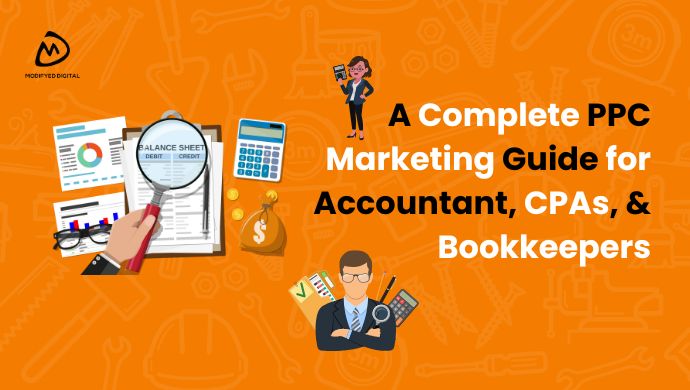The digital age has provided many opportunities for accountants, CPAs, and bookkeepers to advertise their services and reach out to potential clients. One of the most effective ways is PPC (Pay-Per-Click) marketing. However, starting to learn about PPC without a plan can be overwhelming. This guide is specifically designed for financial professionals who want to use Pay Per Click for Accountants.
Understanding PPC’s special position in the digital landscape
PPC marketing works on a simple idea: advertisers pay a fee whenever someone clicks on their ad. These advertisements usually show up on search engine result pages or social media platforms. Financial professionals find PPC particularly powerful because it allows them to target their audience with great accuracy. Accountants can make sure their advertisements show up when someone searches for particular words, such as “small business tax consultant” or “estate planning CPA.”
But, for those who are not familiar with it, the world of PPC can be overwhelming. It involves bidding strategies, keyword research, ad copywriting, and constant optimization. It’s like walking through a maze without a map. If you don’t have enough knowledge, diving into PPC can waste resources in a sector that values accuracy and attention to detail.
That’s exactly why it’s important to have a guide specifically designed for accountants and financial experts. This guide explains pay per click for accountants in a simple way, so professionals can use it effectively without making mistakes. In the fast world of the internet, having a strategic advantage can make a big difference between doing well online and getting lost.
What does Pay-Per-Click (PPC) Marketing mean?
PPC is a type of online advertising where advertisers pay a fee whenever someone clicks on their ad. Businesses have the option to buy website visits instead of getting them naturally. For accountants, this is a great chance to showcase their services to people who are actively looking for them.
Why should accountants think about using PPC?
The pay-per-click for accountants helps accountants focus on specific groups of people, like businesses that need auditing services or individuals who want tax advice.
- Instant outcomes: PPC campaigns can provide instant visibility, unlike SEO which takes time to gain momentum.
- Budget Control: Accountants have the ability to establish a budget for either each day or month. This helps them avoid spending more than the amount of money they have assigned for advertising expenses.
- Measurable return on investment. You can track every click, impression, and conversion to calculate ROI accurately.
The financial industry is not only about numbers; it involves accuracy, understanding, and planning. In the same way, PPC (Pay-Per-Click) is not only about making an ad and hoping for good results. It combines art and science, and for accountants, this can be a valuable opportunity that makes them stand out in the busy digital world. Let’s explore the detailed process of starting a successful PPC campaign specifically designed for financial professionals.
An in-depth exploration
Why is it important: Each person who clicks on your ad could become a customer. However, not every person who clicks is the perfect client for you. By identifying the specific group of people you want to help, you can create a more targeted and effective campaign.
Fascinating idea: Consider more than just the basic characteristics of a group of people. Explore the concept of psychographics in depth. For example, a small business owner may search for more than just “tax services.” They may look for “easy tax solutions for new businesses” to avoid stress. The difference is small but can greatly affect how you target.
Keyword research helps you understand what your clients are looking for. It allows you to speak their language and meet their needs.
Why it is important: In the big ocean of search questions, the correct keyword is like a guiding light, making sure you attract the appropriate audience.
Here’s an interesting idea: Don’t only depend on tools. Consider the discussions you have with customers. What phrases or concerns do they often talk about? Real-world interactions can provide valuable keyword insights.
Creating the Ideal Advertisement: Please provide a brief summary of your digital elevator pitch.
Why is it important: When there are many search results, your ad is your chance to stand out. It is a short time for you to get attention, show value, and get someone to click.
I find it fascinating that storytelling has a strong impact. Try telling a short story or asking a question that makes people think in your advertisement. For instance, “Make sure taxes don’t cause your startup to fail. Let’s come up with a plan together.
Improving Landing Pages: Enhancing Your Online First Impression
Why it is important: When someone clicks on your ad, it is only the start. The landing page is where the conversion occurs.
Here’s an interesting idea: Include testimonials or case studies on your landing page. Allow potential clients to witness the practical effects of your services. Having social proof can greatly increase credibility and the likelihood of conversions.
Create a financial plan. Finding a balance between being ambitious and being cautious.
Why it is important: PPC is a form of investment. Just like any investment, it needs careful planning and management to make sure you get the most returns.
Here’s an interesting idea: Think about using a day-parting strategy. If you notice that most of your conversions happen between 9 AM and 5 PM on weekdays, it could be beneficial to allocate more of your budget during these busy periods.
Here are some common mistakes that you should avoid:
Ignoring Negative Keywords: By adding negative keywords, you can stop your ad from appearing in searches that are not relevant, which helps you save money.
Setting up and then forgetting about it: PPC needs to be checked regularly. Advertising algorithms can change, and strategies that are effective now may not be effective in the future.
Ignoring Mobile Users: Make sure your website and advertisements are designed to work well on mobile devices.
Why PPC is unique in the financial industry:
Pay-per-click advertising is very effective for accountants because people usually look for financial services when they need them. A timely advertisement can attract a business owner who recently realized they require assistance with their year-end financials or an individual who is rushing during tax season.
Moreover, accountants can use PPC’s accurate targeting to divide their campaigns based on their specific areas of expertise. For example, a CPA who focuses on providing tax services for people living abroad can specifically cater to that group of people.
To summarize:
It is important to stand out in the competitive financial services industry. The pay-per-click for accountants offers a straightforward, measurable, and effective way to achieve this. Accountants, CPAs, and bookkeepers can achieve significant growth in their practice by learning the fundamentals, avoiding common mistakes, and consistently improving through digital marketing.
Understanding and using digital advertising can seem overwhelming at first, but by approaching it correctly and being willing to learn, even a specific field like accounting can benefit greatly from PPC.





